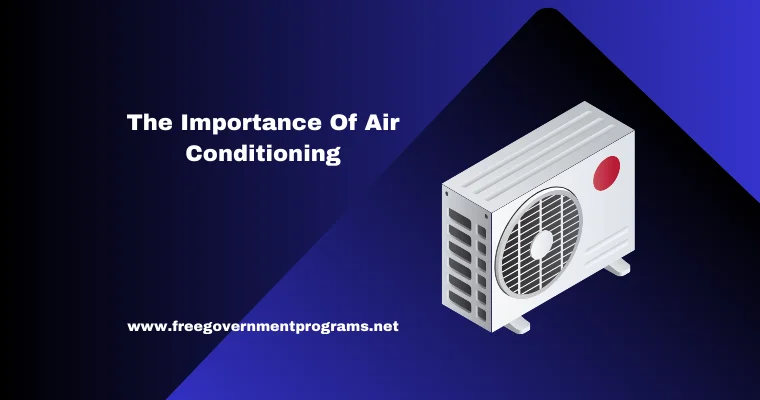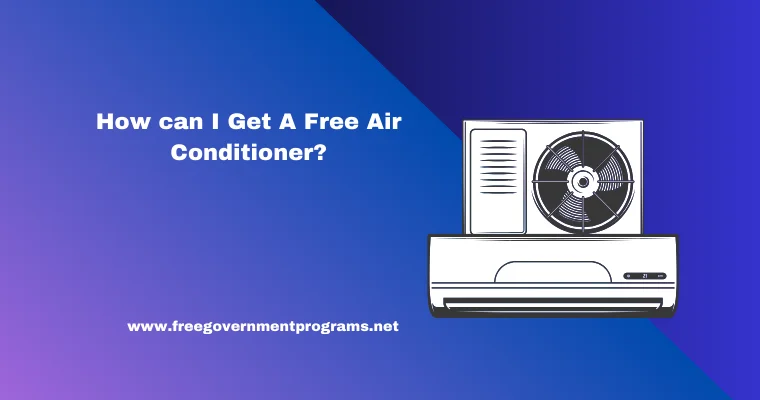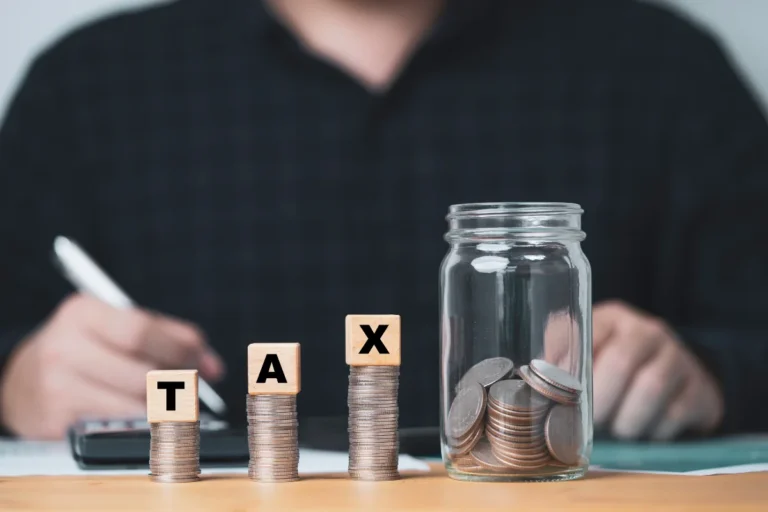Free Air Conditioners From The Government (Get Cool Today)
In the hot summer months, staying cool is not just a matter of comfort. It is a matter of health and well-being, particularly for senior citizens and low-income families. High temperatures can pose serious risks, and not everyone can afford air conditioning. To address this issue, numerous governments and organizations have developed programs to offer free air conditioners to those in need. Here, we explore Free Air Conditioners From The Government eligibility criteria and application processes for these programs.

In addition, they provide a number of benefits to low-income families and senior citizens similar to Free Government Trees. The article will also cover conditioners for veterans and the Salvation Army.
The Importance Of Air Conditioning
Many people take for granted the ability to maintain a comfortable indoor temperature. Nevertheless, it remains a distant dream for many individuals. Extreme heat during the summer may lead to a number of health problems, such as heat exhaustion and heatstroke. People with low incomes, particularly seniors and families, are particularly vulnerable to the effects of extreme heat. Having access to air conditioning can be a lifesaver in many instances.
Top Free Air Conditioner Programs
The government and many charitable organizations are offering free air conditioners in the summer. Programs like these aim to protect the health and well-being of low-income seniors and families. Let’s take a closer look at some programs for free air conditioner for low-income families:
LIHEAP Free Air Conditioner
The Low-Income Home Energy Assistance Program (LIHEAP) is a federal program in the United States. The program helps low-income households with their energy bills. It includes heating and cooling costs. LIHEAP often assists in providing free air conditioners for low-income families. Additionally, it also helps in purchasing or repairing air conditioning units. Consequently, they are comfortable and safe.
Free Air Conditioner For Seniors
Senior citizens are particularly in risky conditions due to the health issues associated with extreme heat. An aging body may have difficulty regulating temperature, while health conditions may suffer. The potential consequences of heat exposure for seniors include;
- Heat exhaustion
- Heatstroke
- Dehydration
- Exacerbation of chronic illnesses
For these reasons, access to air conditioning is crucial for their safety and well-being. Several governments and charitable organizations recognize the unique needs of senior citizens. Therefore, they have initiated programs to provide free air conditioners to those in need.
Salvation Army & Other Charitable Organizations:
Charitable organizations like the Salvation Army often run initiatives to distribute free air conditioners. The organization provides Salvation Army free air conditioners to those in need. Donations and grants are the primary sources of funding for these organizations. During the summer, they are also a vital resource in helping low-income individuals and families keep cool.
Free Air Conditioner For Veterans
Many organizations offer free air conditioners for veterans in recognition of their service. These initiatives receive support from government agencies, veterans’ organizations, and charities. Let’s explore some key programs:
- Department of Veterans Affairs (VA):
In the United States, veterans with service-related disabilities can get assistance with home modifications, including air conditioning. They also offer grants to help pay for the cost of installing energy-efficient windows, insulation, and other energy-saving measures. - Non-Profit Organizations:
The Wounded Warrior Project is one non-profit that offers cooling solutions for veterans. These organizations depend on donations and grants to fund their programs.
Types Of Government-Free Air Conditioners
Government programs that offer assistance with air conditioning. These programs usually focus on providing support for low-income individuals. Also, they provide energy efficiency initiatives and help with air conditioning to vulnerable populations. Programs with these objectives can offer different kinds of air conditioners. Here are some common types of air conditioners that government programs may offer:
Window Air Conditioners:
A free window air conditioner is a popular choice for government programs due to its affordability and ease of installation. Units like these are designed for installation in windows or openings in exterior walls. These are suitable for cooling individual rooms.
Portable Air Conditioners:
Portable air conditioners are another option that may be offered. A free portable air conditioner is an air conditioning unit that is provided free of charge to individuals and households. Generally, it works through government programs, charities, and other initiatives. These portable air conditioners are movable and designed to cool a specific area or room.
Central Air Conditioning Systems:
Some government programs assist low-income households with installing or replacing central air conditioning systems. With the use of ductwork, these systems allow families to have comfortable and energy-efficient homes.
Ductless Mini-Split Systems:
Ductless mini-split systems are a more energy-efficient alternative to central air conditioning. They consist of an outdoor condenser unit and an indoor air handler, allowing zoned cooling. Some programs may offer support for the installation of ductless mini-splits.
Heat Pumps:
Heat pumps can provide both heating and cooling and are recognized for their energy efficiency. Some programs may offer heat pumps to help low-income families with both heating and cooling needs. Climate factors play a significant role in this decision.
Evaporative Coolers:
In dry regions, evaporative coolers are also known as swamp coolers. They are an energy-efficient cooling option. A government program in such areas may assist low-income residents in the installation of evaporative coolers.
Energy-Efficient Models:
Some government programs focus on improving energy efficiency. Specific standards and criteria may apply to support the purchase of energy-efficient air conditioners. Many households find energy-efficient models more expensive, but they can save money in the long run. The government may provide financial assistance to help purchase energy-efficient air conditioners.
Rebates and Vouchers:
The government offers rebates or vouchers for the purchase of air conditioning units. These incentives encourage individuals to invest in more efficient cooling solutions.
Benefits Of Free Air Conditioner Programs
There are many benefits to free air conditioner programs beyond just providing relief from the heat. Let’s explore some of the key advantages:
Improved Health
Access to air conditioning can significantly improve the health and well-being of seniors and low-income families. Additionally, it reduces the risk of heat-related illnesses. It is particularly necessary for elderly and ill individuals.
Enhanced Quality of Life:
A cool and comfortable living environment allows individuals to enjoy their daily lives more fully. It can promote better sleep, reduce stress, and improve emotional and mental health. In addition, cooling solutions can assist in reducing air pollution.
Increased Energy Efficiency:
Modern air conditioning units are often more energy-efficient than older models. Further, providing free air conditioners can help reduce energy bills for low-income families. As a result, it makes it easier for them to manage their finances.
Community Support:
Governments and communities show compassion and care through free air conditioning programs. They offer vital support to those in need and create a sense of solidarity among community members.
Free AC Unit:
Free AC units are targeted at low-income families, seniors, and those with medical conditions. The eligibility criteria and application procedure are in place to assist those most in need. The goal is to ensure that those who are most in need. Especially those who might be at risk of heat-related health issues have access to cooling solutions. Programs offering free AC units can be part of broader initiatives to address:
- Energy poverty
- Promote energy efficiency
- Improve the living conditions of vulnerable populations during extreme weather conditions, especially hot summers.
Apply For Free Air Conditioner
- Eligibility Criteria:
Free air conditioner programs generally have specific eligibility criteria. It determines who qualifies for assistance. In contrast, these criteria may vary from one program to another. But there are some common factors they often share, such as income level, age, and health conditions. - Income Level:
One of the primary eligibility criteria for free air conditioner programs is income level. Applicants must typically fall below a specified income threshold to qualify for assistance. This threshold varies from program to program. However, it is usually set to ensure that those who are most financially vulnerable receive help. - Age:
Many programs focus on assisting seniors, as they are more susceptible to heat-related health issues. Seniors often have different eligibility criteria than families. Some programs exclusively serve seniors over a certain age. - Health Conditions:
Some programs prioritize individuals with specific health conditions that make them especially vulnerable to extreme heat. These conditions may include heart problems, respiratory issues, or other chronic illnesses.
Application Process
Applying for free air conditioners from government programs and charitable organizations typically involves a straightforward process. The exact steps may differ, but here is a general overview of what applicants can expect:
Research & Locate Programs
Start by researching free air conditioner programs available in your area. It can be done online or by contacting local government agencies or non-profit organizations. Make a list of programs that you may be eligible for.
Gather Necessary Documents
Most programs will require applicants to provide certain documents to verify their eligibility. These documents may include proof of income, identification, medical records, and more. It’s essential to have these documents ready when applying.
Complete The Application
Once you’ve identified the programs you’re eligible for and gathered the required documents, you can start the application process. Some programs offer online application forms, while others may require in-person visits or paper applications. Carefully complete the application, ensuring that all information is accurate and up-to-date.
Await Notification
After submission of your application, you will need to wait for a response. It may take some time, as programs often receive a high volume of applications. Don’t panic. Be patient at this point and follow up.
Installation and Maintenance
If your application is approved, the program will provide you with a free air conditioner and also handle its installation. Some programs also offer maintenance services to ensure that the units are in good working condition.
Finding a Free Air Conditioner Near Me
Here are some steps to help you find programs and resources in your area:
Local Government Resources
Contact your local government’s social services or community development department. They can provide information about government-sponsored programs or refer you to local non-profit organizations that offer assistance.
Charitable Organizations
Reach out to charitable organizations, such as the Salvation Army, United Way, or community foundations. These organizations often run programs to distribute free air conditioners to those in need.
Online Research
Use the internet to search for free air conditioner programs in your area. Many organizations have websites or online resources that provide information about eligibility, application processes, and contact details.
Community Centers and Senior Centers
Visit or contact community centers, senior centers, or other local social service agencies. They may have information about programs specifically serving seniors or low-income individuals and families.
Giveaway
A free air conditioner giveaway program allows individuals, organizations, and businesses to distribute free air conditioners. Many organizations, community groups, businesses, and government agencies organize these giveaways. Typically, recipients are low-income individuals or vulnerable groups. The goal of these giveaways is to provide cooling relief to individuals or families. Those without access to air conditioning equipment can still use it. Heat and discomfort make cooling particularly important.
How can I Get A Free Air Conditioner?
Obtaining a free air conditioner can vary depending on your location and the specific programs or resources available. Here are general steps you can take to get a free air conditioner potentially:

- Research local programs and resources.
- Check eligibility criteria (income, age, health conditions).
- Complete the application process as required.
- Contact local organizations and social services.
- Look into energy assistance programs like LIHEAP.
- Seek referrals from social workers or healthcare providers.
- Stay informed about local announcements.
- Consider energy-efficient cooling options with incentives.
- Keep in mind that availability and criteria may vary by location.
Frequently Asked Questions (FAQs):
How can I get free AC?
To apply for a free AC, research local programs and contact social services or non-profits. Some government programs and charities offer free air conditioners to low-income individuals or those facing extreme heat. So, stay informed about local initiatives, and be patient during the application process.
How can I get a free HVAC system?
Obtaining a free HVAC system may require government or nonprofit assistance. Check local programs, meet eligibility criteria, and submit applications. Social services, community organizations, and energy efficiency initiatives may offer help. To increase your chances of receiving a free HVAC system, follow application procedures carefully.
Where can I get a free air conditioner?
You can get a free air conditioner through government programs, charities, or community initiatives. Research local resources, check eligibility criteria, apply through designated channels, and contact social services or non-profits. Stay informed about announcements and be patient during the application process.
Conclusion:
In summer, free air conditioner programs are essential to ensuring that needy populations stay safe and comfortable. These programs provide a lifeline for those who might otherwise be at risk of heat-related health issues. Access to air conditioning not only improves physical health but also enhances the overall quality of life for recipients.
As demand for these programs rises, collaboration between governments, charities, and communities is necessary to expand their reach. Supporting these programs ensures that no one suffers from extreme heat, promoting community health and safety.





